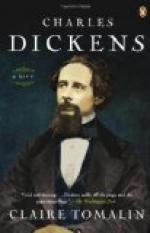What between “Bleak House,” Household Words, and “The Child’s History of England,” Dickens, in the spring of 1853, was overworked and ill. Brighton failed to restore him; and he took his family over to Boulogne in June, occupying there a house belonging to a certain M. de Beaucourt. Town, dwelling, and landlord, all suited him exactly. Boulogne he declared to be admirable for its picturesqueness in buildings and life, and equal in some respects to Naples itself. The dwelling, “a doll’s house of many rooms,” embowered in roses, and with a terraced garden, was a place after his own heart. While as to the landlord—he was “wonderful.” Dickens never tires of extolling his virtues, his generosity, his kindness, his anxiety to please, his pride in “the property.” All the pleasant delicate quaint traits in the man’s character are irradiated as if with French sunshine in his tenant’s description. It is a dainty little picture and painted with the kindliest of brushes. Poor Beaucourt, he was “inconsolable” when he and Dickens finally parted three years afterwards—for twice again did the latter occupy a house, but not this same house, on “the property.” Many were the tears that he shed, and even the garden, the loved garden, went forlorn and unweeded. But that was in 1856. The parting was not so final and terrible in the October of 1853, when Dickens, having finished “Bleak House,” started with Mr. Wilkie Collins, and Augustus Egg, the artist, for a holiday tour in Switzerland and Italy.
FOOTNOTES:
[20] “History of English Literature,” vol. v.
[21] “Recollections of Writers,” by Charles and Mary Cowden Clarke.
[22] As, for instance, in such expressions as this: “The stamp on newspapers is not like the stamp on universal medicine bottles, which licenses anything, however false and monstrous.”
[23] The last number of Household Words appeared on the 28th of May, 1859, and the first of All the Year Round on the 30th of April, 1859.
[24] There are one or two slight discrepancies between Forster’s narrative and that of Miss Dickens and Miss Hogarth. The latter are clearly more likely to be right on such a matter.
CHAPTER X.
On his return to England, just after the Christmas of 1853, Dickens gave his first public readings. He had, as we have seen, read “The Chimes” some nine years before, to a select few among his literary friends; and at Lausanne he had similarly read portions of “Dombey and Son.” But the three readings given at Birmingham, on the 27th, 29th, and 30th December, 1853, were, in every sense, public entertainments, and, except that the proceeds were devoted entirely to the local Institute, differed in no way from the famous readings by which he afterwards realized what may almost be called a fortune. The idea of coming before the world in this new character had long been




